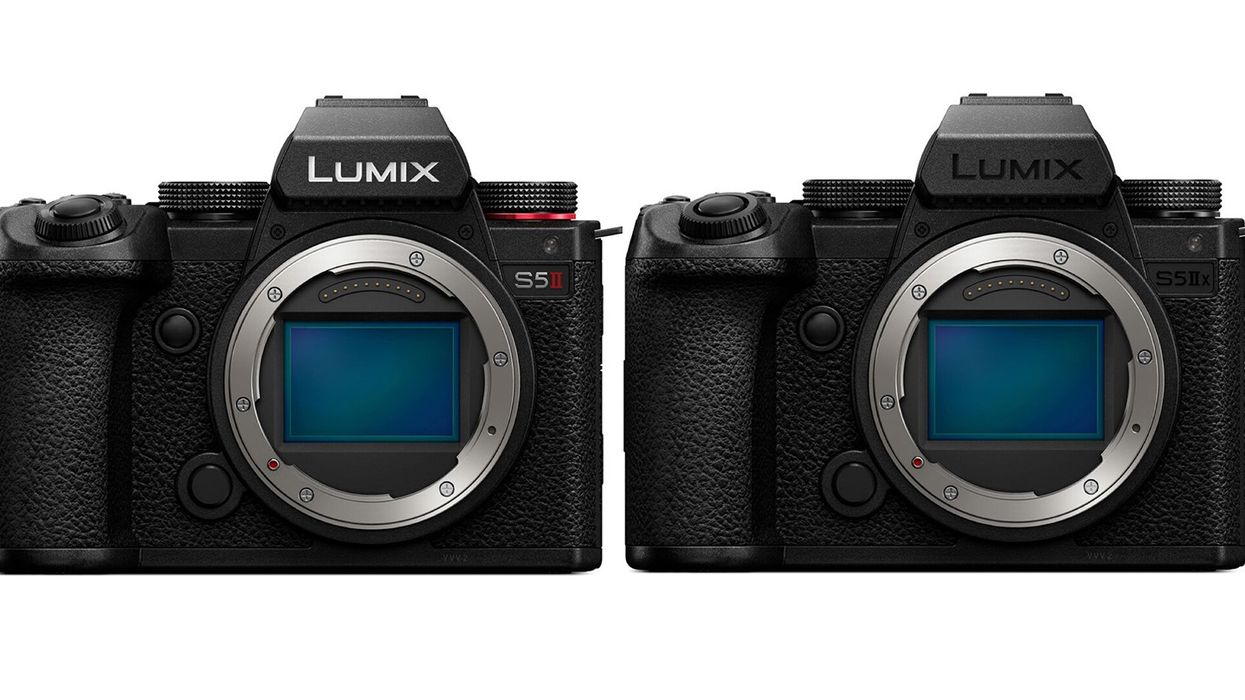What’s the Difference Between the Panasonic S5 II and the S5 IIX?
Besides the “X” of course, let's break down the difference between these two cameras.

So many cameras, so little timally dive into what makes them different from each other. Is a Blackmagic Pocket Cinema Camera 6K right for you, or are you more of a Blackmagic Pocket Cinema Camera 6K Pro person? Is the Canon R5 right or the Canon R5 C? Sometimes, with these not-fully-updated editions, it can be quite tricky to tell which one is truly the superior camera — or, more importantly — simply right for you.
Today let’s take a comparative look at the new Panasonic S5 IIX to see how it differentiates from its predecessor Panasonic S5 II.
Of course, they’re very similar cameras. When you look at the specs, it might be hard to find a single difference in sensor size, recording rate, or some of the other basic stats. However, as we’ll go over, there are some key elements that are worth exploring, especially if you’re a videographer lookreally focus on live streaming and other remote video workflows.
Let’s dive into each below.

The Panasonic Lumix S5 II
Starting with the “original” of the two (although certainly not the original Panasonic S5 camera), the Panasonic S5 II is one of the manufacturer’s flagship cameras aimed at content creators with strong needs in both still and video performance. Equipped with a 24.2MP sensor and enhanced processor, the S5 II records 6K video for up to 30 minutes and at an impressive 30p 4:2:0 10-bit clip. The S5 II also boasts an advanced Active I.S. system for enhanced stabilization for handheld run-and-gun.
At a sub-$2,000 price point, the S5 II is popular with film and video professionals looking for a highly capable video-centric camera that gives you all the expected bells and whistles but doesn’t break the bank chasing 8K.
Here are the full specs and price:
- 24.2MP full-frame CMOS Sensor
- 6K30p 4:2:0 10-Bit Video Recording
- C4K/4K60p 4:2:2 10-Bit Unlimited
- 3.68m-Dot 0.78x-Magnification OLED LVF
- 3.0" 1.84m-Dot Tilt/Free-Angle Touch-LCD
- 779-Point Phase-Detection AF System
- 5-Axis Sensor-Shift Image Stabilization
- ISO 100-51200, up to 30 fps Shooting
- Dual UHS-II SD Slots; Wi-Fi & Bluetooth
- Weather-Sealed Construction
Price: $1,997.99

The Panasonic Lumix S5 IIX
Now, moving on to the Panasonic S5 IIX, we have — in a lot of ways — the same camera.
The S5 IIX boasts a similar 24.2MP full-frame CMOS sensor capable of 6K video at 30p in 4:2:0 10-bit recording. The S5 IIX also boasts a new sensor design and an updated processing engine with L2 technology, making this the first Lumix camera to offer Phase Hybrid AF tailored for fast and precise autofocus performance.
However, the S5 IIX also includes some new sophisticated video features, which all come preloaded with this X edition. And the S5 IIX offers HDMI RAW video data output and USB-SSD, ALL-Intra, and ProRes recording. It is also set to include new Live Streaming functionality, which includes Wireless IP streaming, USB tethering to smartphones, and Wired IP streaming.
Here are the specs and price as well.
- 24.2MP full-frame CMOS Sensor
- 6K30p 4:2:0 10-Bit Video Recording
- C4K/4K60p 4:2:2 10-Bit Unlimited
- 3.68m-Dot 0.78x-Magnification OLED LVF
- 3.0" 1.84m-Dot Tilt/Free-Angle Touch-LCD
- 779-Point Phase-Detection AF System
- 5-Axis Sensor-Shift Image Stabilization
- ISO 100-51200, up to 30 fps Shooting
- Dual UHS-II SD Slots; Wi-Fi & Bluetooth
- Weather-Sealed Construction
Price: $2,197.99
Comparing the Panasonic S5 II and the S5 IIX
As you can see in the video above, the major differences between the Panasonic S5 II and the S5 IIX have to do with the pro video features which the IIX includes out of the box. Unlike the S5 II, which is tailored more as a still and video hybrid, the S5 IIX leans much more into the video side of its design, and the upgraded (or unlocked) features are all about more sophisticated video work.
Let’s start with what’s the same, though.
Both cameras have the same sensor and the same metrics for low-light performance and dynamic range. They have the same processors and should see the same autofocus performance and overall color science. Each camera can also record 6K video at up to 30 fps and has the same recording times and even audio features.
The biggest diff really have to do with ProRes RAW recording (which the S5 II does offer with a paid firmware update, but not quite at the clip that the S5 IIX offers). The S5 IIX can record ProRes via USB-C SSD and also includes wired and wireless IP streaming (which also requires a USB-LAN adapter which is sold separately) along with USB-C tethering.
Also notable, the S5 IIX offers twice the data rate for 4K video, which should be helpful for videographers looking to fully embrace a remote workflow setup. Ultimately the value of the S5 IIX is tied to one’s ability and needs for live streaming and remote video. If you’re looking to invest in a camera to help you from convention floors or out run-and-gun, these are the points that might interest you.
However, if you’re viewing the S5 IIX as some majorly upgraded version of the S5 II for everyday in-studio needs, it might not be worth the extra $200.
Let us know your thoughts on which camera sounds more interesting to you in the comments below.











